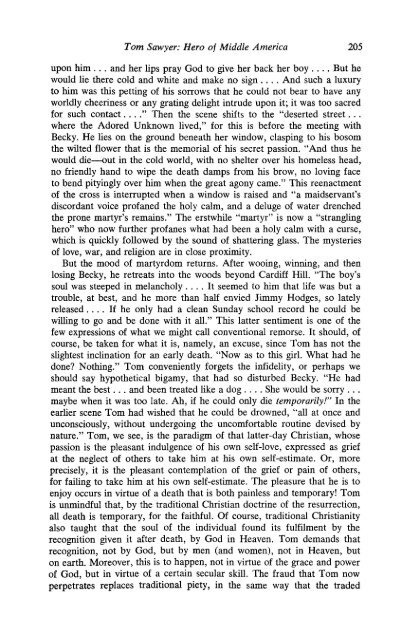Interpretation: A Journal of Political Philosophy
Interpretation: A Journal of Political Philosophy
Interpretation: A Journal of Political Philosophy
You also want an ePaper? Increase the reach of your titles
YUMPU automatically turns print PDFs into web optimized ePapers that Google loves.
Tom Sawyer: Hero <strong>of</strong> Middle America 205<br />
upon him . . . and her lips pray God to give her back her .... boy<br />
would lie there cold and white and make no sign .... And<br />
But he<br />
such a luxury<br />
to him was this petting <strong>of</strong> his sorrows that he could not bear to have any<br />
worldly cheeriness or any grating delight intrude upon it; it was too sacred<br />
for such contact . . . Then the scene shifts to the "deserted street . . .<br />
where the Adored Unknown lived,"<br />
for this is before the meeting with<br />
Becky. He lies on the ground beneath her window, clasping to his bosom<br />
the wUted flower that is the memorial <strong>of</strong> his secret passion. "And thus he<br />
would die out in the cold world, with no shelter over his homeless head,<br />
no friendly hand to wipe the death damps from his brow, no loving face<br />
to bend pityingly over him when the great agony<br />
came."<br />
This reenactment<br />
<strong>of</strong> the cross is interrupted when a window is raised and "a maidservant's<br />
discordant voice pr<strong>of</strong>aned the holy calm, and a deluge <strong>of</strong> water drenched<br />
the prone martyr's<br />
hero"<br />
remains."<br />
The erstwhUe "martyr"<br />
is now a "strangling<br />
who now further pr<strong>of</strong>anes what had been a holy calm with a curse,<br />
which is quickly followed by the sound <strong>of</strong> shattering glass. The mysteries<br />
<strong>of</strong> love, war, and rehgion are in close proximity.<br />
But the mood <strong>of</strong> martyrdom returns. After wooing, winning, and then<br />
losing Becky, he retreats into the woods beyond Cardiff HiU. "The boy's<br />
It seemed to him that life was but a<br />
soul was steeped in melancholy ....<br />
trouble, at best, and he more than hah envied Jimmy Hodges, so lately<br />
released .... If he only had a clean Sunday school record he could be<br />
aU."<br />
wiUing to go and be done with it This latter sentiment is one <strong>of</strong> the<br />
few expressions <strong>of</strong> what we might call conventional remorse. It should, <strong>of</strong><br />
course, be taken for what it is, namely, an excuse, since Tom has not the<br />
slightest inchnation for an early death. "Now as to this girl. What had he<br />
done? Nothing."<br />
Tom conveniently forgets the infidelity, or perhaps we<br />
should say hypothetical bigamy, that had so disturbed Becky. "He had<br />
meant the best . . . and been treated like a .... dog<br />
She<br />
maybe when it was too late. Ah, if he could only die<br />
would be . . . sorry<br />
temporarily!"<br />
In the<br />
earlier scene Tom had wished that he could be drowned, "all at once and<br />
unconsciously, without undergoing the uncomfortable routine devised by<br />
nature."<br />
Tom, we see, is the paradigm <strong>of</strong> that latter-day Christian, whose<br />
passion is the pleasant indulgence <strong>of</strong> his own self-love, expressed as grief<br />
at the neglect <strong>of</strong> others to take him at his own self-estimate. Or, more<br />
precisely, it is the pleasant contemplation <strong>of</strong> the grief or pain <strong>of</strong> others,<br />
for faUing to take him at his own self-estimate. The pleasure that he is to<br />
enjoy occurs in virtue <strong>of</strong> a death that is both painless and temporary! Tom<br />
is unmindful that, by the traditional Christian doctrine <strong>of</strong> the resurrection,<br />
aU death is temporary, for the faithful. Of course, traditional Christianity<br />
also taught that the soul <strong>of</strong> the individual found its fulfilment by the<br />
recognition given it after death, by God in Heaven. Tom demands that<br />
recognition, not by God, but by men (and women), not in Heaven, but<br />
on earth. Moreover, this is to happen, not in virtue <strong>of</strong> the grace and power<br />
<strong>of</strong> God, but in virtue <strong>of</strong> a certain secular skill. The fraud that Tom now<br />
perpetrates replaces traditional piety, in the same way that the traded

















